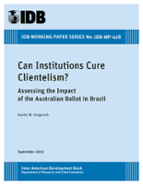Can Institutions Cure Clientelism?: Assessing the Impact of the Australian Ballot in Brazil
Date
Sep 2013
This paper examines how the adoption of the Australian ballot (AB), and ipso facto, the transition from the nominal to effective secret vote, shaped the nature of party politics in Brazil. Engaging the literature on political clientelism, the impact of the AB on three outcomes is studied: 1) the ideological leanings of voters at the ballot box; 2) the degree of electoral control enjoyed by local vote brokers; and 3) the capacity of citizens to effectively participate in the electoral process. In order to get leverage on these issues, the paper utilizes an original dataset -painstakingly assembled from regional electoral archives- which contains municipal-level vote returns for federal deputy and senate contests during the period before and after the AB's introduction in Brazil (1958-1962). The dataset exploits the fact that the AB was introduced at different times in different states and for different offices in the country, thereby creating an unprecedented opportunity to assess the impact of this institution. Using a triple difference-in-difference procedure, the study finds that the AB: 1) shifted the ideological balance of power from Right to Left; 2) did not greatly weaken the hand of vote brokers; and 3) greatly increased the proportion of wasted votes cast in elections.



